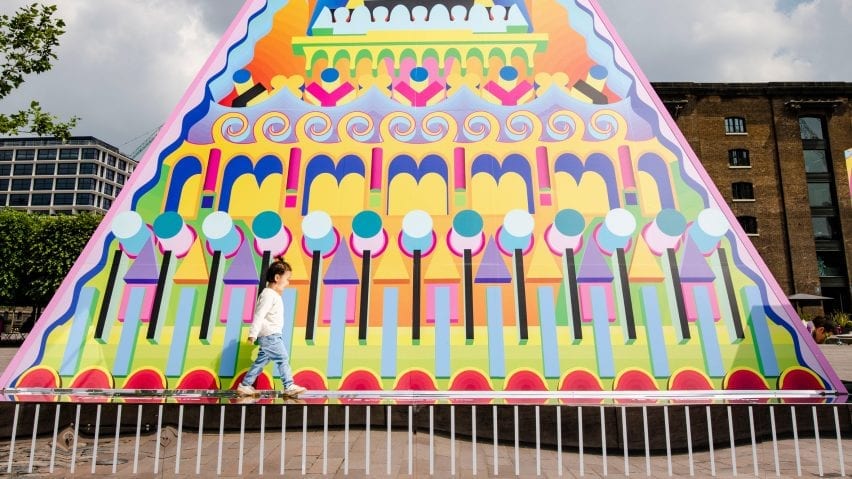Designer Adam Nathaniel Furman has created an installation called Proud Little Pyramid at King's Cross in London that was unveiled in LGBT+ Pride month.
Created to celebrate the reopening of King's Cross following coronavirus lockdown, the Proud Little Pyramid is located in Granary Square.
Furman hopes that the structure, which is wrapped in seating, will bring joy to those returning to the area.
"The idea was to kind of create something that is monumentally joyful," he told Dezeen.
"So it's an anti-monument monument. It's ridiculously fun, over the top, camp."
Built from the recycled structure of a Christmas tree installation that previously stood in Coal Drop's Yard, the 9.5-metre-high pyramid is covered in Furman's signature colourful motifs.
Surrounding the pyramid is a mirrored plinth with four corner towers that functions as bench seating.
"Fundamentally, it's a big seat," explained Furman. "It functions in a really simple way as a place to meet that orientates people around the site."
"It's a kid's version of a huge monumental complex," he continued. "The whole base is mirrored creating constantly changing ornamentation at the base, which reflects the surroundings and lots of colours that will always be changing."
The pyramid form that rises from the base is decorated in a series of motifs that were informed by the surrounding industrial architecture.
It is topped with four emoji-like characters that the designer refers to as "flamboyantly ridiculous".
"It uses the forms that I like to use, which in this instance come from Victorian architecture and the heritage of the site," said Furman.
"They are my shapes but composed in a way that references the local context in the super-neon, poppy way that I like to work."
The bright pyramid opened to the public as part of LGBT+ Pride month and as the name Proud Little Pyramid suggests, was created as a celebration of King's Cross' queer history.
"It was designed very much with the intention of it being opened in Pride month as an exuberant, ornamented piece of design fun," said Furman.
"It references my own work in a typically camp way but also the queer history of the site, which I've basically grown up with," he continued.
"I hope this helps in a little way bring increased visibility to LGBTQ+ identities in design, and LGBTQ+ issues in general. Many queer young people are struggling in difficult circumstances especially with the enforced isolation of Covid, but they can be helped by an interested public by supporting charities like AKT."
The installation is the first project to come out of Furman's six-month-long residency at the King's Cross estate.
It will be followed by a series of installations around the site, including decorating the hoarding of the construction site for the BIG and Heatherwick Studio-designed Google building.
"King's Cross has been the backdrop for so much of my life – I have learnt, loved and laughed here," Furman said.
"In the 90s, I was regular at iconic nightclubs The Cross and the Scala and later a student and then a teacher at Central St Martins," he continued.
"Whilst I have taken inspiration for my residency from King's Cross' recent queer history, I have also looked back to London's Victorian heritage in which dramatic monuments of all sizes, from water fountains and public loos to tube stations, memorials and town halls brought accessible decorative art to public spaces."
"I want to make history and its complexity instantly present and fun."
The King's Cross estate in central London has been developed over the past decade. The pyramid stands near the entrance of the Thomas Heatherwick-designed Coal Drop's Yard shopping centre and Tom Dixon's studio and showroom.
Designer Furman previously created a sequence of tiled archways in Granary Square as part of London Design Festival.
Photography is by John Nguyen.

